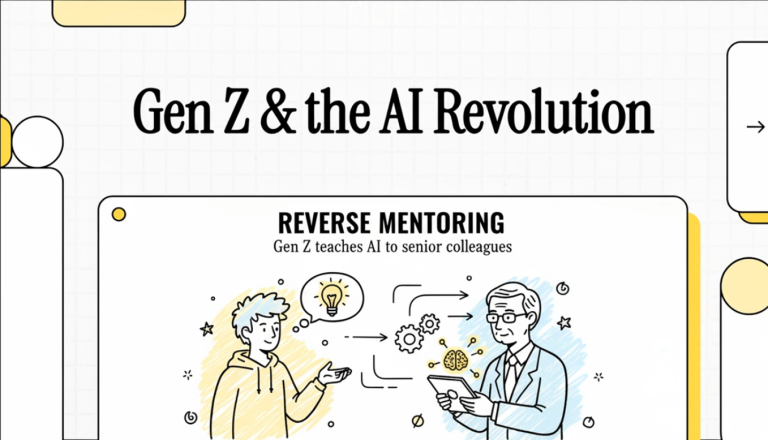Introduction: Beyond the Stereotypes
The prevailing narrative around Generation Z and artificial intelligence is often a simple one: they are “AI natives” who will either be seamlessly replaced by automation or will use it to mindlessly automate every task. But a closer look at recent data reveals a far more complex and surprising reality. Far from being passive adopters, the first AI-fluent generation is actively reshaping the workplace with a sophisticated blend of anxiety, ambition, and a surprisingly human-centric approach.
This article explores the counter-intuitive truths about how Gen Z is navigating the AI revolution. They aren’t just using the tools; they are building new ones, reversing traditional hierarchies, and, in doing so, are creating a new playbook for human-AI collaboration that older generations must learn from.
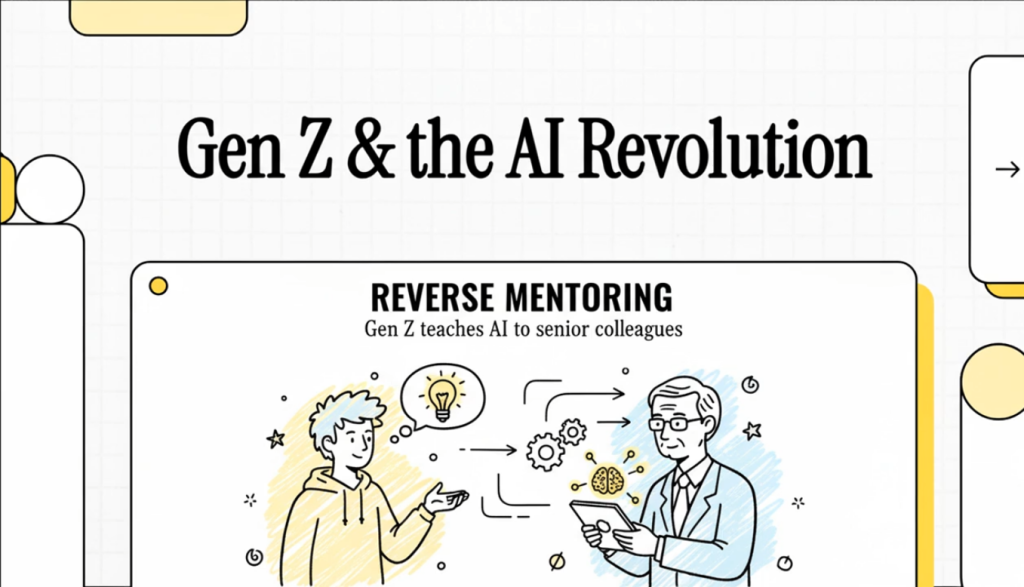
1. The “Digital Native” Is a Myth. Meet the “AI Apprentice.”
While Gen Z has grown up in a digital-first world, this fluency doesn’t automatically confer AI competency. An EY survey found that young professionals often overestimate their AI literacy, a gap that has tangible consequences. Research from Aithor shows that while nearly 80% of Gen Z professionals use AI for over half of their work tasks, many lack the critical skills to evaluate its output.
This leads to what the “Work Re_Wired” transcript calls a “shallow learning” paradox. Almost half (49%) of young professionals feel they don’t learn new things as deeply since incorporating AI into their workflow, as the technology handles the initial summarization or drafting that builds foundational knowledge.
Yet, here is the surprising twist: despite this concern, 92% of these same workers are highly confident in their ability to critically assess and challenge AI-generated content. They are not blindly trusting the machine. This paints a picture not of flawless natives, but of “AI apprentices”—a generation actively learning to master a powerful new tool, complete with the struggles, critical judgment, and healthy skepticism that come with any true apprenticeship. This apprenticeship model—defined by both struggle and critical judgment—is precisely what fuels their proactive response to AI anxiety, leading them not to fear, but to build.
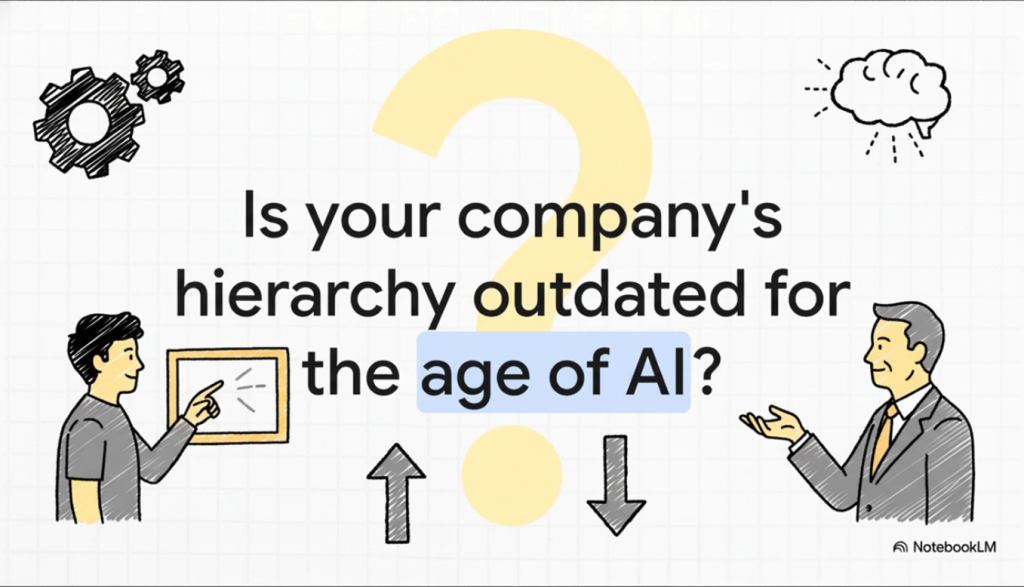
2. They’re Anxious About AI—So They’re Building Their Own “Agent Bosses.”
Recent data from the “Work Re_Wired” transcript reveals a stark “AI Paradox”: a high level of anxiety coexists with an equally high level of ambition. A significant 71% of Gen Z professionals worry that AI could lead to fewer jobs in their field, a figure that skyrockets to 87% in the finance sector where automation’s potential feels most immediate.
Instead of being paralyzed by this fear, they are channeling it into innovation. Over 60% of these early-career professionals have gone beyond using off-the-shelf software and have built or customized their own AI agents or chatbots tailored to their specific jobs. They are, in effect, creating their own “agent bosses” to boost their performance.
Consider these powerful examples from the “Work Re_Wired” transcript:
- Jet Potter, a senior consultant, built an AI agent to act as a “sparring partner,” allowing him to transform a shaky first draft into a polished third or fourth draft before it ever reaches his human manager. The agent critiques his writing style and legal logic, saving valuable senior review time.
- Isa Chowri Jvi at Microsoft created a custom “Gen Z agent” to handle the constant, repetitive questions new hires ask about internal formatting and communication tone. This simple bot saves her an estimated two hours of interruption-filled work each week.
This behavior represents a powerful form of agency—a preview of a future where the most impactful innovations don’t come from top-down directives, but from bottom-up, user-driven solutions to immediate problems.
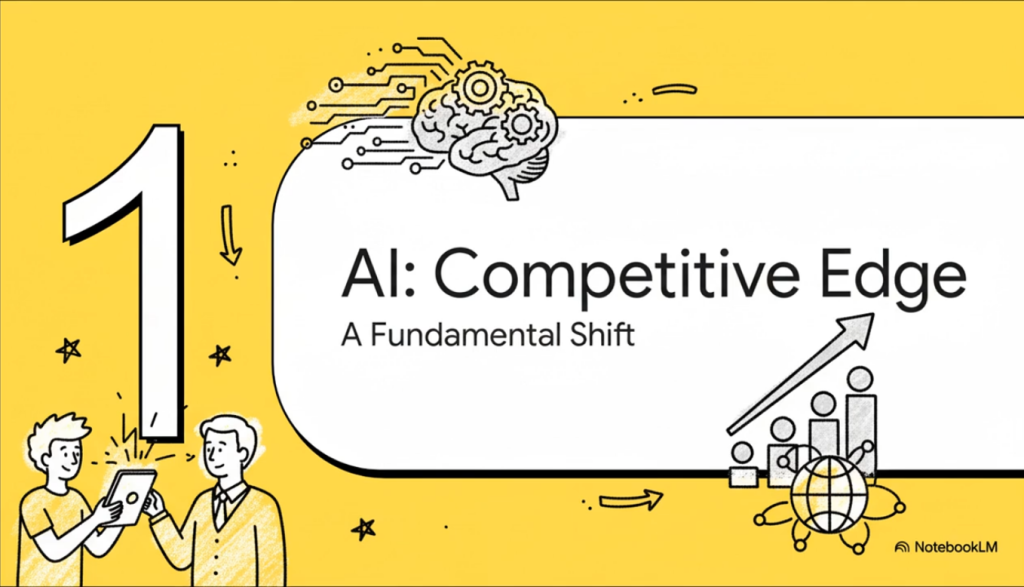
3. The Biggest Workplace Shift Isn’t AI Replacing People. It’s Gen Z Teaching Their Bosses.
What’s emerging organically in workplaces is a powerful trend of mutual or reverse mentorship. The scale of this shift is striking and is quantified by multiple sources:
- A survey by International Workplace Group (IWG) found that nearly two-thirds of younger employees are actively helping older colleagues adopt and learn AI tools.
- The “Work Re_Wired” transcript reveals that 83% of early-career professionals report that a senior leader has actively asked them for input on how to use AI.
This shift is built on mutual respect. As Mark Dixon, CEO of IWG, notes, “Our research shows that older colleagues are showing real openness to AI and, just as importantly, to learning from younger generations.” He adds:
“This two-way exchange not only bridges generational divides but also flattens traditional hierarchies.”
The old model of senior experts teaching junior apprentices is becoming a “two-way street.” Gen Z is not just adopting new technology; they are actively driving its cultural integration from the ground up, ensuring the entire organization benefits from their digital fluency.
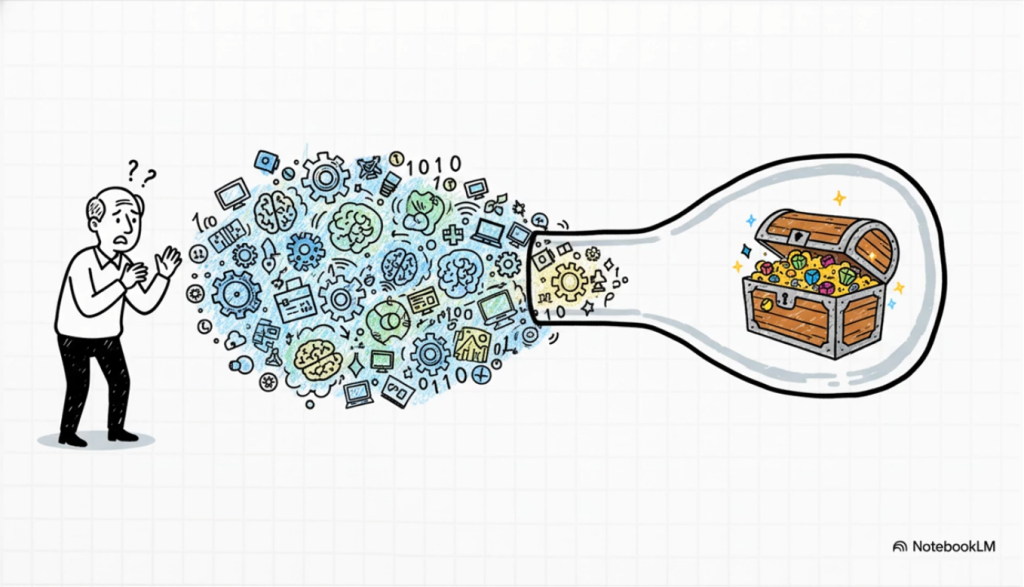
4. They’re Hyper-Digital, But Crave Face-to-Face Learning.
Given their frequent use of AI and other digital tools for daily tasks, one might assume Gen Z would prefer to learn the same way. However, the KPMG Intern Pulse Survey reveals the opposite. Despite being digital natives, Gen Z overwhelmingly prefers in-person and hands-on learning methods over digital ones.
Their preferences break down as follows:
- Most Preferred Learning Methods: Hands-on practice projects, peer-to-peer knowledge sharing, and in-person training sessions.
- Least Preferred Learning Methods: Short-form videos and AI-powered adaptive learning.
This preference extends to relationship-building. Interns reported that in-person office interactions were the most useful way to build professional relationships and that they most hope to gain a mentoring relationship with their manager. This reveals a sophisticated understanding among Gen Z: they see AI as a powerful tool for productivity, but recognize that deep learning, meaningful connection, and true mentorship—their stated top goal for an internship—are still fundamentally human endeavors.
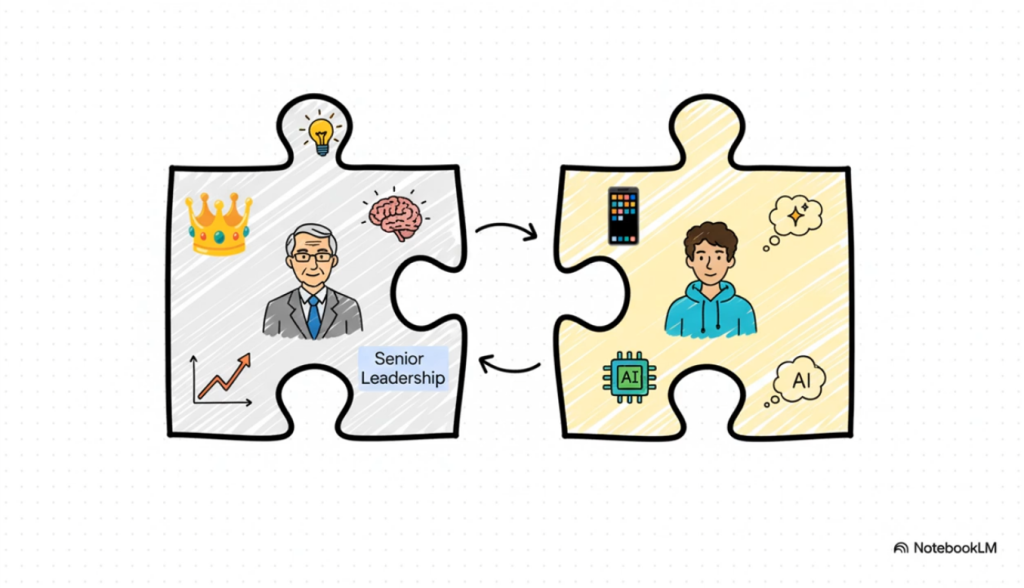
5. They Don’t Think AI Replaces Wisdom.
This final truth synthesizes their entire approach to the new world of work. While confident in their digital skills, they are not naive about the limits of technology. According to data from the “Work Re_Wired” transcript, Gen Z is paradoxically more likely than their Millennial counterparts (21% vs. 15%) to believe that traditional experience and tenure are important for career progression.
Their logic is clear: they understand that AI cannot replace the nuanced judgment, strategic insight, and ethical considerations gained from years of human experience. They know when to turn off their “AI coach” and consult a human manager for high-stakes, complex issues.
Lawyer Kiara Morris perfectly exemplifies this balance. She runs mock trials against an AI opponent that acts as opposing counsel, sharpening her arguments and building confidence. But when it comes to developing the actual case strategy, she relies on the wisdom of her human manager. For Gen Z, the future of work is not about replacement; it’s about augmentation, where cutting-edge technology and hard-earned human experience must coexist.
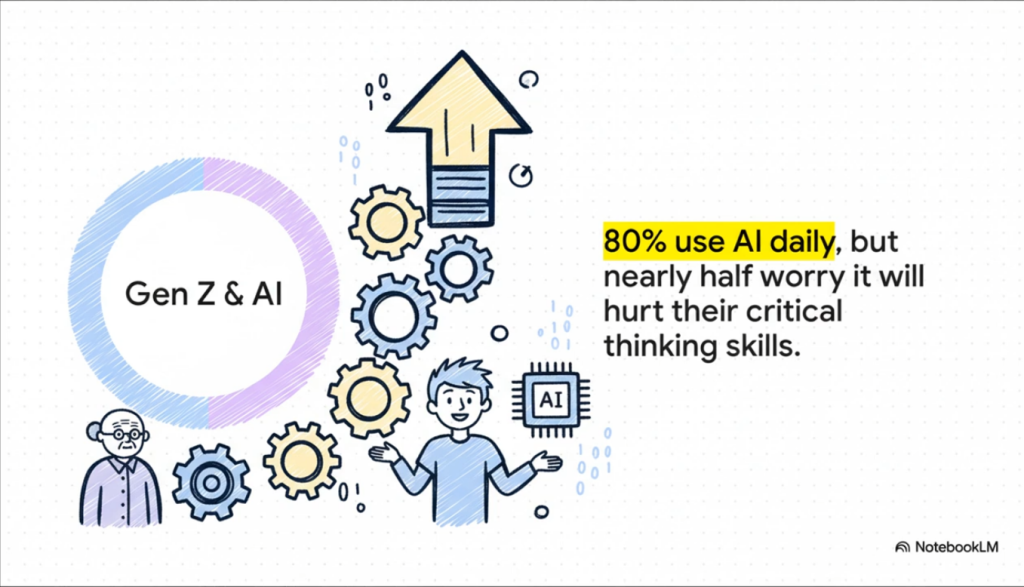
Conclusion: A New Era of Human-AI Collaboration
Ultimately, Gen Z’s relationship with AI reveals a fundamental recalibration of workplace value. They instinctively balance the productivity gains of automation with the irreplaceable wisdom of human experience, treating AI not as a replacement for skill, but as a tool that demands even greater human judgment. They are not just adopters; they are the first generation of true AI integrators.
Their proactive and nuanced approach leaves leaders and organizations with a critical question to ponder, as articulated in the “Work Re_Wired” transcript:
“If Gen Z professionals are already building their own internal AI hype squads… creating custom agents to pre-vet their legal arguments… and automating a growing chunk of the routine grunt work, what strategic core skill is left? What must managers focus on coaching, knowing that AI is handling more and more of the basics?”
See our YouTube Channel:
The above video in Tamil language:


